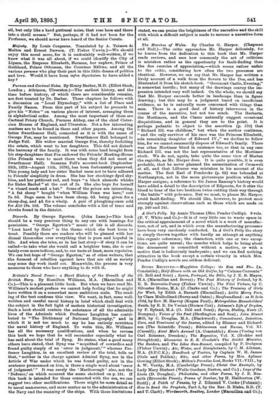Britain's Naval Power : a Short History of the Growth
of the British Navy. By Hamilton Williams, M.A. (Macmillan and Co.)—This is a pleasant little book. But when we have read Mr. Williams's modest preface we cannot help feeling that he might have written it on a somewhat more ambitious scale. The read- ing of the text confirms this view. We want, in fact, some well- written and careful naval history in brief which shall deal with the subject in the full light of modern historical investigation. Such a book should contain the substance of all the admirable lives of the Admirals which Professor Laughton has contri- buted to " The Dictionary of National Biography," and in which it is not too much to say he has entirely rewritten the naval history of England. To write this, Mr. Williams has all the necessary qualifications, and when he revises this book we hope that he will reconsider especially what he has said about the trial of Byng. He states, what a good many others have stated, that Byng was " acquitted of cowardice and found guilty simply of an ` error in judgment," whereas Pro- fessor Laughton, in an excellent review of the trial, tells us that, " neither in the charge against Admiral Byng, nor in the Article of War under which he was found guilty, nor in the sentence pronounced on him, is there a single word about error of judgment'" It was surely the Marlborough' also, not the
Defence,' on which occurred the scene sketched on p. 181. If this book is intended for those connected with the sea, we can suggest two other modifications. There might be more detail as to naval manceuvres, and more matter as to the administration of the Navy and the manning of the ships. With these limitations
Istated, we can praise the brightness of the narrative and the skill with which a difficult subject is made to assume a narrative form at all.


































 Previous page
Previous page